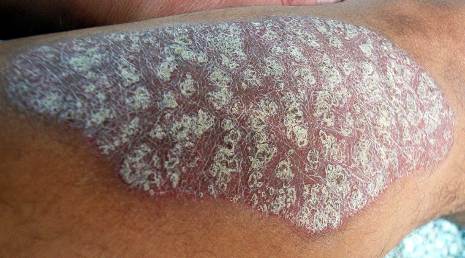A Picture of Psoriasis and Psoriasis information is below:

Psoriasis
What is Psoriasis?
Psoriasis is a skin condition that occurs when our skin cells grow too quickly. The main cause for this is our immune system cause new skin cells to form in days instead of the normal, which is weeks. The body does not shed the excess skin cells, instead the skin cells pile up and form patches, which then can lead to lesions on the skin.
Roughly 125 million people around the world have some form of psoriasis. Psoriasis affect men and women equally. Also some studies show that a family history of psoriasis, may increase the risk your chance of having psoriasis as well.
What are some of the symptoms?
The lesions vary in appearance, size and color. There are nine types of psoriasis: Plaque, guttate, pustular, inverse, erythrodermic, palmoplantar, psoriatic arthritis, scalp and ear, and nail psoriasis. Roughly 80% of those who have psoriasis also have plaque psoriasis. Plaque psoriasis causes patches of thick, scaly skin that may be white, silvery, and sometimes red. Plaque is usually found in these areas: the elbows, knees, lower back, and scalp.
Psoriasis also can affect the finger nails and toe nails. Roughly 5%-10% of people who have psoriasis will see a change in their fingernails and/or toe nails. If the nails begin to change color, such as: yellow/orange or become pitted. This may be an early warning sign of psoriatic arthritis.
Is Psoriasis contagious?
No, Psoriasis is not contagious. You can not get psoriasis from touching someone, or being in a pool or hot tub with some one who as Psoriasis.
Can stress cause Psoriasis?
Yes, there is a strong correlation between stress and psoriasis. As the body is more stressed the immune system is like wise stressed to. Here are some famous people with psoriasis, that are bought on by stressful jobs.
Common Triggers for Psoriasis
Here are some of the common triggers.
- Cold and dry weather
- Some Drugs/Medications
- Infections or disease
- Irritation to the skin
- Alcohol, Coffee, and Smoking
